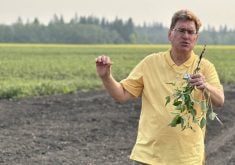OTTAWA – For Canada’s farm equipment manufacturers, this year isn’t The Great One or The Next One.
It is just a year like most of the past 10 – another year of flat or declining sales.
Sales estimates for the year prepared for the annual meeting of the Canadian Farm and Industrial Equipment Institute in June suggested sales of all models but four-wheel-drive tractors will decline in 1995.
Declines will be modest but the year will not mark the end of the industry sales slump that many hoped would follow the implementation of a new world trade deal.
Read Also

Key actions identified to address canola tariffs
Federal and Saskatchewan governments discuss next steps with industry on Chinese tariffs
Instead, a slowing Canadian and American economy, combined with a federal government decision to slash spending and subsidies in its winter budget, mean another year of flat sales.
Predictions are that sales of self-propelled tractors will fall l.2 percent this year to 1,768 units.
Total tractor sales are predicted to fall 1.7 percent to 12,783 units.
Demand should improve
Lawrence Ruud, vice-president and marketing manager for John Deere Ltd., told the meeting that buoyant grain markets and prices should help stir demand in the grain sector.
However, uncertainty over the impact of the loss of the Crow Benefit rail transportation subsidy and subsequent higher freight rates will dampen the buying mood, he predicted.
And there is trouble looming in the cattle sector, which means cattle producers will be hesitant to buy equipment.
He said U.S. feedlots are holding more cattle now than they have in 22 years.
“Prices are beginning to slide and it is expected that we will see a mid-season pronounced weakening of this market after mid-summer,” he said in a report distributed by the institute.
Meanwhile, dairy farmers are facing subsidy cuts but also have more security in their view that the supply management system, which regulates prices and supplies for certain commodities, will survive.
Ruud noted worries about a slowing economy.
He said all the structural adjustments in agriculture likely mean that the main purchasers in future will be larger farmers.
Slow sales will continue for another year, he said.
















